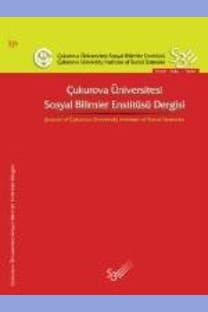Work-Related Basic Need Satisfaction Scale: Analysis Of Construct Validity And Reliability in Turkish
Basic Need Satisfaction, Scale, Validity, Reliability, Turkish
___
- References Baard, P. P., Deci, E. L., & Ryan, R. (2004). Intrinsic need satisfaction: A motivational basis of performance and well-being in two work settings. Journal Of Applied Social Psychology, 34(10), 2045-2068. Baumeister, R. F., & Leary, M. R. (1995). The need to belong: Desire for interpersonal attachments as a fundamental human motivation. Psychological Bulletin, 117(3), 497-529. deCharms, R. (1968). Personal causation. New York: Academic Press. Deci, E. L., Connell, J. P., & Ryan, R. M. (1989). Self-determination in a work organization. Journal of Applied Psychology, 74(4), 580-590. Deci, E. L., & Ryan, R. M. (1985). Intrinsic motivation and self-determination in human behavior. New York: Plenum. Deci, E. L., & Ryan, R. M. (2000). The “what” and “why” of goal pursuits: Human needs and the self-determination of behavior. Psychological Inquiry, 11(4), 227-268. Deci, E. L., & Ryan, R. M. (2002). Handbook of self-determination research. Rochester, NY: University of Rochester Press. Gagné, M., & Deci, E. L. (2005). Self-determination theory and work motivation. Journal Of Organizational Behavior, 26(4), 331-362. Lynch, M. F., Plant, R. W., & Ryan, R. M. (2005). Psychological needs and threat to safety: Implications for staff and patients in a psychiatric hospital for youth. Professional Psychology-Research and Practice, 36(4), 415-425. doi:10.1037/0735-7028.36.4.415 Ryan, R. M., & Deci, E. L. (2006). Self-regulation and the problem of human autonomy: Does psychology need choice, self-determination, and will? Journal of Personality, 74(6), 1557-1585. doi:10.1111/j.1467-6494.2006.00420.x Sheldon, K. M., & Elliot, A. J. (1998). Not all personal goals are personal: Comparing autonomous and controlled reasons for goals as predictors of effort and attainment. Personality and Social Psychology Bulletin, 24(5), 546-557. Van den Broeck, A., Vansteenkiste, M., De Witte, H., Soenens, B., & Lens, W. (2010). Capturing autonomy, competence, and relatedness at work: Construction and initial validation of the Work-related Basic Need Satisfaction scale. Journal Of Occupational And Organizational Psychology(83), 981–1002. White, R. W. (1955). Motivation reconsidered: The concept of competence. Psychological Review, 66(5), 297-333.
- ISSN: 1304-8880
- Yayın Aralığı: 2
- Başlangıç: 2013
- Yayıncı: Çukurova Üniversitesi Sosyal Bilimler Enstitüsü Dergisi
Kümeleme Yöntemiyle Konut Talebinin İncelenmesi: Türkiye İl Grupları Üzerine Bir Uygulama
TASARIMDA PROBLEM ÇÖZME EYLEMİ KAPSAMINDA DOKUMA KUMAŞ TASARIMINDA ÖRNEK BİR UYGULAMA
Havva HALAÇELİ METLİOĞLU, Hacer DURMAZ
Tasarımda Problem Çözme Eylemi Kapsamında Dokuma Kumaş Tasarımında Örnek Bir Uygulama
Havva HALAÇELİ METLİOĞLU, Hacer DURMAZ
Erdinç KARADENİZ, Fatih GÜNAY, Selda DALAK, Mehmet BEYAZGÜL
Fatih GÜNAY, Erdinç KARADENİZ, Selda DALAK, Mehmet BEYAZGÜL
Bolu'da Erken Cumhuriyet Dönemi Sonrası Konut: Kopuşlar ve Süreklilikler
Assessment of Hybrid Artificial Neural Networks and Metaheuristics for Stock Market Forecasting
Ayşe Tuğba DOSDOĞRU, Aslı BORU, Mustafa GÖÇKEN, Mehmet ÖZÇALICI, Tolunay GÖÇKEN
